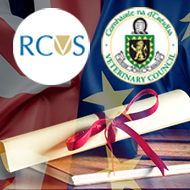RCVS and VCI reaffirm mutual recognition of veterinary degrees

(Caption here)
The RCVS and the Veterinary Council of Ireland (VCI) have issued a joint statement reaffirming the mutual recognition of veterinary degrees once the Brexit transition period ends on December 31.
In October 2019, the two organisations approved the mutual recognition agreement (MRA), meaning that, following the UK's exit from the EU, veterinary surgeons from the UK and Ireland will continue to be eligible to register in each other’s jurisdictions.
The statement reads: 'The VCI and the RCVS wish to emphasise that regardless of whether a trade agreement has been signed between the EU and the UK by 1 January 2021, this will have no bearing on the Mutual Qualification Recognition Agreement currently in place. The option remains open to any veterinary surgeon with a recognised qualification in veterinary medicine from UCD or an accredited programme in the UK to apply to register in the other jurisdiction.
'It is hoped that the Mutual Qualification Recognition Agreement will assist veterinary surgeons qualifying from Ireland and the United Kingdom in ensuring their ability to register and practise in the other country where they wish to do so.'
VCI CEO and registrar Niamh Muldoon, said: “We would like to thank the Royal College of Veterinary Surgeons for their collaboration in developing this Mutual Qualification Recognition Agreement, which will significantly benefit veterinary practitioners in both the UK and Ireland.
"This historic agreement will enable graduates of Irish and UK veterinary schools to continue to seek to practise in the other country when they wish. We look forward to continuing to collaborate with our colleagues in the RCVS in the future for the benefit of the profession in both countries.”
RCVS president Mandisa Greene, said: “I am very glad to be able to affirm our continuing working partnership with our friends and colleagues in the Republic of Ireland. We know that veterinary surgeons based both in Northern Ireland and the Republic of Ireland have clients and undertake work on both sides of the border, and this Mutual Recognition Agreement will help to ensure that UK and Ireland-qualified veterinary surgeons are able to register in each other’s jurisdictions where required.
“I too look forward to continuing to work closely with the VCI both on a bilateral basis, and via pan-European institutions such as the Federation of Veterinarians of Europe.”



 The latest
The latest